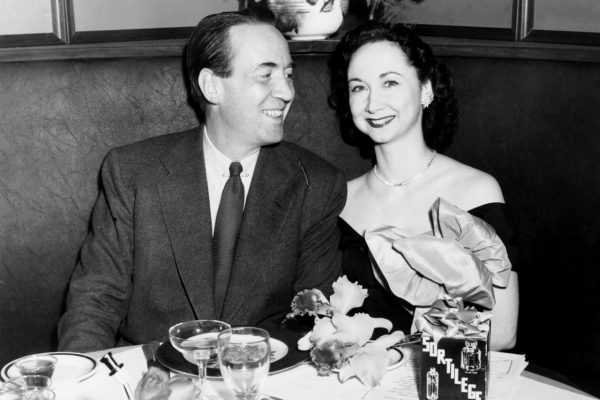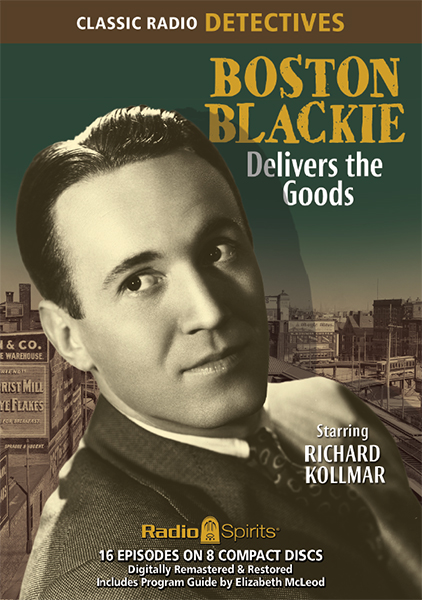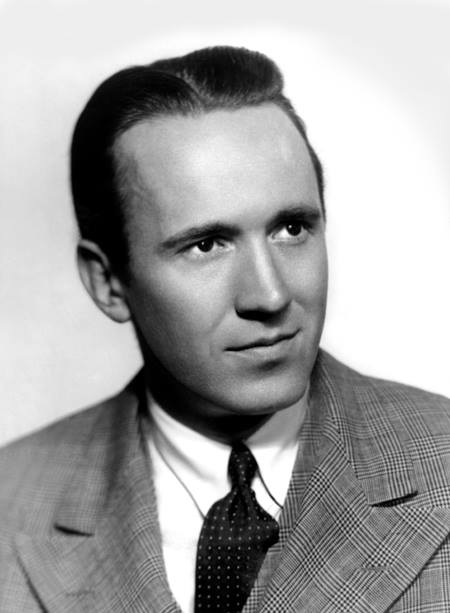Happy Birthday, Richard Kollmar!
Posted by Ivan G. Shreve, Jr. on Dec 31st 2017
From 1941 to 1949, Columbia Pictures entertained devoted moviegoers with a series of films based on a character created by author Jack Boyle in 1914. The Boston Blackie franchise was comprised of fourteen B-movies that brilliantly mixed comedy and mystery. They starred Academy Award nominee Chester Morris as Horatio “Boston Blackie” Black as a reformed safecracker/jewel thief who frequently found himself embroiled in crime investigations…and under suspicion from his nemesis on the police force, Inspector Farraday (played by Richard Lane). Despite their “second feature” status, the films are still engaging to watch today, with outstanding entries like Meet Boston Blackie (1941) and Confessions of Boston Blackie (1941) able to hold their own against any “A” mystery produced at that time.
Morris and Lane reprised their movie roles for a 1944 NBC radio series that aired as a summer replacement for Amos ‘n’ Andy. The actor who became best known for portraying Blackie on radio, however, was Dick Kollmar—born Richard Tompkins Kollmar in Brooklyn on this date in 1910. Kollmar had an impressive family background: his great-great grandfather was Daniel D. Tompkins—the fourth Governor of New York and, later, sixth Vice-President of the United States (under James Monroe). But young Richard also had a reputation for being a “hellion,” prompting his father to enroll him in a New Jersey school for “problem boys” (his family had moved to the Garden State when he was an infant). Kollmar would later attend Tusculum College in Tennessee, where he developed an interest in acting (in addition to being editor of the student newspaper and a member of the glee club), which encouraged him to enroll in the Yale School of Drama after graduation.
Dick Kollmar never fulfilled his commitment to Yale, however, because he landed a job in radio. And when he moved back to New York City for further opportunities in the medium, he began getting stage work. Kollmar made his Broadway debut in 1938’s Knickerbocker Holiday. He followed that up with Too Many Girls (1940), and later not only appeared in the 1941 musical revue Crazy with the Heat but wrote songs for that production as well. Kollmar enjoyed a fruitful career as a director-producer of such shows as By Jupiter (1942-43), Early to Bed (1943-44), and Are You with It? (1945-46). Dick continued his theatrical work in the 1950s with the likes of Plain and Fancy (1955-56) and The Body Beautiful (1958).
On radio, Kollmar was one of the busiest actors in daytime drama. He portrayed John Perry, the titular hero of John’s Other Wife, and David Naughton on Claudia and David. Dick also emoted on Life Can Be Beautiful (as Barry Markham), Pretty Kitty Kelly (Jackie Van Orpington/Dennis Pierce), and When a Girl Marries (Paul Stanley). On Big Sister, Kollmar essayed the role of Michael West…and reprised the role when that character was spun-off onto another soap, Bright Horizon. His radio resume also includes announcing duties on The Alan Young Show and The Adventures of Topper, not to mention Gang Busters, Grand Central Station, Great Plays, The Radio Reader’s Digest (he was the host from 1946-47), and Theatre of Romance.

Richard Kollmar is best remembered for two old-time radio gigs. I’ve mentioned Boston Blackie, a show on which he performed from 1945-50. (It was syndicated by Ziv but was also heard on Mutual outlets.) Maurice Tarplin co-starred on that program (as Farraday), along with Lesley Woods and Jan Miner (as Blackie’s gal Friday Mary Wesley). But on April 15, 1945, Dick launched his longest-running radio venture with his wife Dorothy Kilgallen (a Broadway columnist for The New York Journal-American): Breakfast with Dorothy and Dick. A precursor to the morning talk shows that permeate television nowadays, Breakfast originated in the Kollmars’ 16-room apartment on Park Avenue and 66th Street. It featured “one of America’s most charming couples” (according to WOR publicity) engaging in a 45-minute conversation about their fabulous lives, friends and family. They were heard live Monday through Saturday, with a pre-recorded edition on Sunday (while they no doubt slept in).
Although it was only a local program, it’s been estimated that the audience for Breakfast with Dorothy and Dick reached 20 million listeners regularly…which is why sponsors no doubt knocked one another down for an opportunity to advertise on the show. The Kollmars’ program was originally put together as a replacement for a similar show hosted by Ed and Pegeen Fitzgerald, who had jumped ship from WOR to WJZ after launching their show in 1942. (The Fitzgeralds later had quite the heated rivalry with the Kollmars.) With their children Richard, Jr. (Dickie) and Jill, loyal retainer Julius (the butler), and a chirpy canary named Robin, the Kollmars made mornings cheerier for loyal listeners until their final sign-off on March 21, 1963. (That classic Fred Allen/Tallulah Bankhead parody of the radio couple who get up on the wrong side of the bed owes a lot to Breakfast with Dorothy and Dick, by the way.)
Richard Kollmar had only one movie credit: the 1948 B-picture thriller Close-Up. He fared much better on the small screen, with guest roles on series like The Web and Armstrong Circle Theatre, and hosting gigs on the likes of Broadway Spotlight and Guess What? He appeared multiple times as a panelist (three times as a “mystery guest”) on What’s My Line?, a show that featured Mrs. Kollmar (Dorothy) as a regular. Dick never really got over the passing of Dorothy in 1965 (there is still speculation as to the details of her death, which some believe was connected to the JFK assassination). Although he remarried in 1967 (to fashion designer Anne Fogarty), he was said by close friends to be often despondent and depressed. Kollmar went on to his greater reward in 1971 at the age of 60 after an overdose of barbiturates.

In honor of Richard Kollmar’s birthday, Radio Spirits invites you to check out our latest release of classic Boston Blackie broadcasts: Boston Blackie Delivers the Goods. The title is not hyperbole, by the way; it’s an eight-CD set containing sixteen thrilling escapades of the famed sleuth from 1947. “Enemy to those who make him an enemy! Friend to those who have no friends!”

